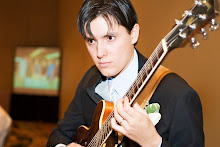This week, our church is celebrating the 20th anniversary of the school it founded, Our Savior New American School. To highlight the event, our worship service will use scripture readings not taken from the normal lectionary cycle. This brings up one of the advantages of lectionary teaching: Flexibility. Low church opponents of following a pericopal system of reading, such as the Revised Common Lectionary, often object on the grounds of its strictness. They might say, if I follow this cycle, I am legalistically bound to whatever it says and have no freedom to address specific concerns in the church body. However, as our church demonstrates, this is completely untrue. The lectionary cycle does not put the preaching ministry in a straightjacket, but it liberates it. It frees the church from being subjected to whatever special revelation the pastor had after last night's proverbial bad pizza by focusing the attention on Christ, his life and work, and looking at this in its entirety throughout the year. At the same time, few protestant churches are legally bound to this cycle. Most who make good use of it are also free to make full exception from it whenever necessary. So at Our Savior, we lean on it as a beneficial, edifying tool for Christo-centricity in worship, while holding it with an open hand, free to deviate as occasion may lead.
All that to say, this week our Psalm is taken from the first eight verses of chapter 78, instead of from the cycle recommendation. I had a brief devotional to share at choir rehearsal last night concerning the significance of what this Psalm says in relation to Christian education. Here it is:
Psalm 78: This passage instructs us concerning the value of us instructing the generation that follows us in the ways of the Lord. What are we teaching them? How do we teach them? We are commanded to not hide the things of the Lord, but teach our children. This is God’s ordained method of the faith being handed down. This is our tradition. Essentially, that is what a tradition is: The manner in which you continually hand down the faith to successive generations. We do this so that they can, as verse seven says, set their hope on God. Singing is a part of our tradition, so consider the role of our song in directing people where to set their hope. Our song ought to inspire hope in God. Music can even have the ability to melt stubborn hearts. Consider the far reaching spiritual aspect of how we sing. In terms of the war that is happening in the spiritual realm, when we sing we are fighting against the spiritual forces of evil. Our faith is something we live (instead of live your life and share your faith, live your faith and share your life), and it is something we sing. What we sing simultaneously expresses and forms our identity. The deeds of the Lord are indeed glorious and worthy of being sung. If we find, when it comes together for singing, that we do not feel the song in our hearts, consider that we have possibly become stubborn, in that we have forgotten how much God gives to us. Take a moment to meditate on the goodness of God and the graciousness of his gifts of forgiveness, life, and salvation. Meditate on these and allow them to be the impetus that stirs within your heart a song. Our song, however, ought not be constantly happy. If we can learn anything from the Psalms, it is the appropriateness of expressing our lament to the Lord, should that be all that we can offer to Him in honesty. This is what it means to set our hope in God, and through doing this, we will not forget his works but keep his commandments. The generations yet unborn are counting on us, so let us remember, with rejoicing, the wonders the Lord has done.
Subscribe to:
Post Comments (Atom)




Another advantage of using the common lectionary is that I know that I will hear an OT and NT lesson, a Pslam and the Gospel even if the pastor does use any scripture in his sermon. Likewise, the historic liturgy has full if biblical references.
ReplyDeleteHow many churches that don't use the lectionary have a series of bible readings are part of their standard service? Is the only time that bible read out loud is when the pastor reads a passage prior to his sermon, if event that?
Exactly. What you honor in worship is honored in life. Many "bible believing" evangelical churches, if you look at their liturgy, show that they honor their own opinions more than God's actual words. My previous church had 55 minute sermons based on half a verse (though others were certainly references as well). The result was the pastor was free to preach some fairly heretical and recent theologies without the brunt of scriptural clarity calling him on the carpet. Many of the things he directly said would be explicitly contradicted by God's own words in the liturgical services I now enjoy.
ReplyDeleteI love especially the format of OT, Psalm, Epistle and Gospel. I first discovered this in the Daily Office lectionary at the back of the Book of Common Prayer. I never realized how healthy it was to look directly at Jesus every day through reading a passage of the Gospel. Those four books are just so exclusively central to the faith, their consistent use in the worship life of the church is just absolutely essential if we want to keep our focus oriented correctly.